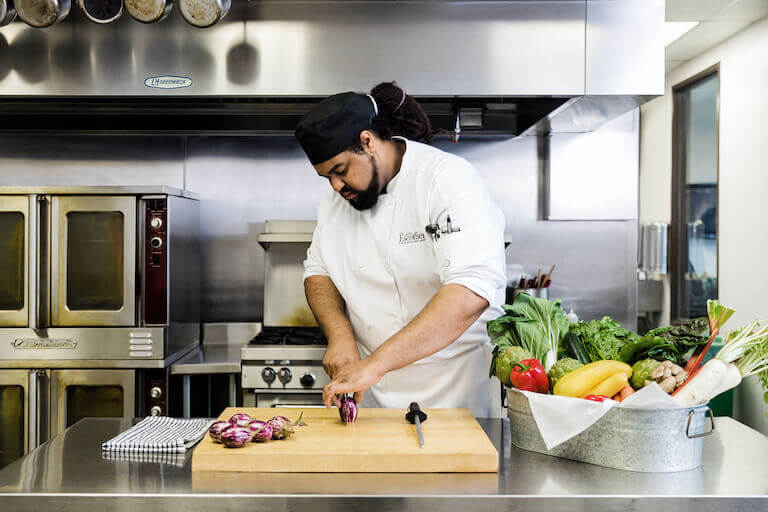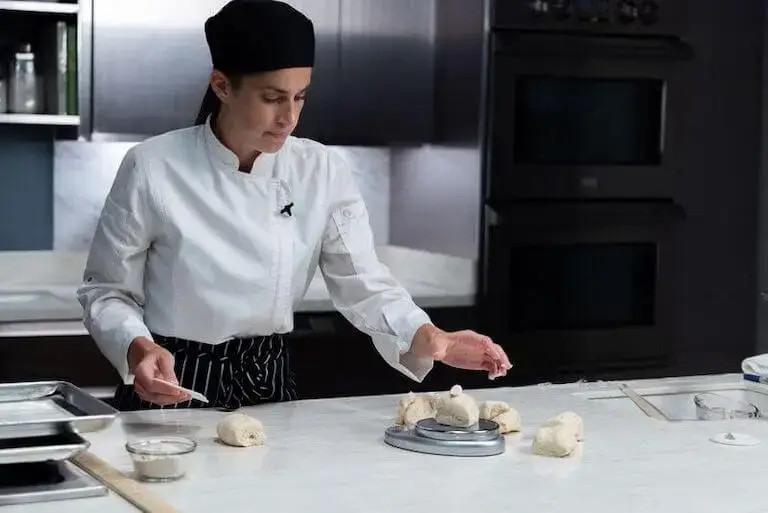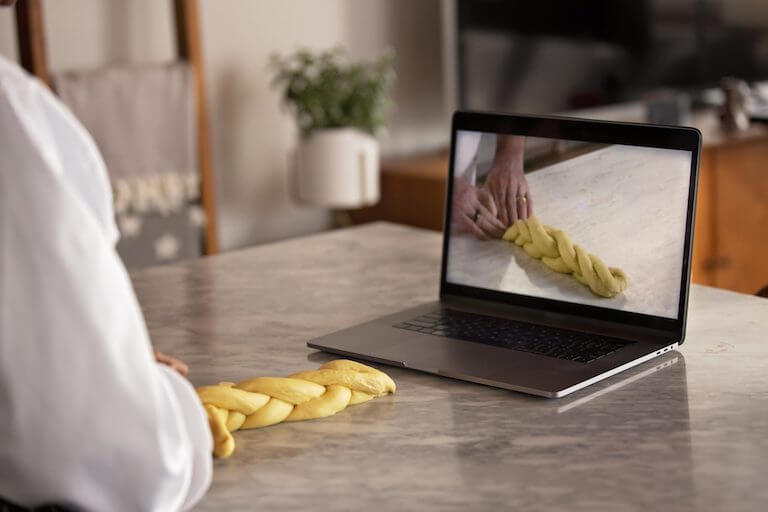Listen to This Article:
Thinking about a career in the culinary arts? You probably have a lot of questions.
What’s the best way to get started?
Should you specialize?
And perhaps the biggest one: Do you need to go to culinary school to become a chef?
As to the last question, the short answer is: no. Culinary school is not an industry-wide requirement to become a chef. But for many reasons we’ll discuss, it can be a wise investment in your future. And if you’re serious about your career in the culinary or pastry arts, you should consider the benefits of attending culinary school.
Why Is Culinary School a Wise Investment for Future Chefs?
If you’re passionate about food and serious about turning that passion into a career, culinary school can offer a major advantage. It’s not about just learning to cook, it’s about gaining professional level skills, building confidence, and making valuable connections throughout the program, like culinary mentors.
And now might be an excellent time to do so. According to the U.S. Bureau of Labor Statistics, the demand for chefs and head cooks is projected to grow by 8% through 2033, faster than the average for all occupations. And as of 2024, the median annual wage for chefs and head cooks was $60,990, with top earners making more than $90,000, especially those working in hotels, upscale restaurants, or as private chefs.
Culinary school can help you build the skills and credibility to compete for those roles, all while giving you the structure, mentorship, and hands-on experience you may need to succeed.
Let’s explore a few more reasons why culinary school could be a smart step toward your future.
Prove Your Dedication to Your Craft
If you’re serious about exploring how to become a chef, you probably want to learn all you can, and that’s exactly what culinary school could help you do. Through structured training and hands-on experience, you can build real, professional-level skills that can form the foundation of a lasting career.
But formal education does more than teach techniques. It shows employers that you’ve made a serious investment in your future. Choosing a culinary program signals that this isn’t just a job, it’s your chosen path.
Escoffier graduate Michael Fields is a prime example. After leaving a demanding career in finance, Michael enrolled in culinary school to pursue a lifelong passion. “I only missed two classes the entire time I was there. I was never late,” he recalled.
That kind of commitment didn’t go unnoticed. With guidance from his Chef Instructors, Michael was introduced to the team at Franklin Barbecue, one of the most celebrated barbecue restaurants in the country. Michael landed a job there and then, through dedication as well as precision in his work, Michael moved through the ranks into the coveted front-of-house cutter role.
And in an industry where turnover is expensive, that kind of commitment can stand out. A graduate with focused training brings more than just technical ability. They can bring reliability, enthusiasm, and the long-term potential every kitchen leader hopes to find.
Improve Your Employment and Salary Prospects
A formal culinary education can help you stand out in a competitive job market. Many employers value candidates who come prepared with solid foundational skills, professional training, and a clear commitment to life in the kitchen.
Graduates of accredited institutions may have an easier time finding work, and may even start at higher salaries, especially in structured kitchens like hotels, resorts, and private clubs, where culinary training is often preferred or required.
Over time, those advantages may compound into higher earnings and faster promotion potential.

Hands-on training teaches the skills employers are looking for.
Get a Credential You Can Take With You
No matter where your culinary career takes you, your educational credentials will remain valid. A culinary or pastry degree or diploma never expires.
Plus, a formal culinary education can unlock access to respected industry certifications. Organizations like the American Culinary Federation (ACF) and Retail Bakers of America (RBA), offer advanced credentials, like Certified Master Pastry Chef® and Certified Master Chef®. Many of these require accredited education, in addition to years of experience and rigorous testing.
These titles are highly respected throughout the industry and can prove that you’re at the top of your field. Even experienced restaurant owners seek out formal training. Geno Vento, owner of Philadelphia’s iconic Geno’s Steaks, enrolled in Escoffier’s online program to sharpen his skills and build greater confidence in the kitchen—proof that learning never stops, no matter where you are in your career.
Meet a Demand for Educated Culinarians
If you’re considering a career in the kitchen, now may be the perfect time to get started. The restaurant industry is growing, and employers are actively looking for skilled culinary professionals to fill their teams.
In 2025, the industry expected to add approximately 200,000 new jobs, bringing the total workforce to 15.9 million employees. These stats make the restaurant industry the second-largest private-sector employer in the U.S., according to the National Restaurant Association.
And yet, 70% of restaurant owners say they have job openings that are hard to fill. That means if you’re trained, curious, and ready to work, the opportunities could be out there. Culinary school can help you step into that gap. After graduation, you could have a wide-ranging choice of entry-level positions in restaurants, hotels, catering kitchens, and more. And with the anticipated increase in chef positions over the next decade, you may be perfectly placed to earn that title just when the industry needs you most.
What Do We Mean By “Culinary School”?
Culinary education comes in many forms, and they’re not all the same. If you’re going to invest time, effort, and money into your education, it’s important to carefully weigh the type of institution that you’re trusting with your future.
Accredited Culinary School Programs
To receive accreditation, a culinary school must prove that its programs meet certain industry and academic standards. Accreditation is a complex process designed to verify the quality of a school’s curriculum and administration. This helps you and other potential students to assess the merit of each program.
Accredited programs may offer degree or diploma tracks. The most common are associate degrees in culinary and pastry arts, though some schools offer bachelor’s degrees.
Escoffier’s Austin and Boulder campuses (including the online programs) each have national accreditation, as well as memberships in the National Restaurant Association, the International Association of Culinary Professionals (Boulder Leadership), and World Association of Chefs Societies.
As you explore your options, you may find yourself asking, how much is culinary school? While costs vary depending on the program and institution, one clear advantage of an accredited institution like Escoffier is access to federal student aid, like loans and grants, for eligible students who apply and qualify. This means you could have more ways to help fund your education than you would through non-accredited programs.
To check a school’s accreditation status, search the Database of Accredited Postsecondary Institutions and Programs and the Council for Higher Education Accreditation websites.
Community College or University Culinary Programs
Some community colleges and universities offer culinary and pastry arts programs as well. These programs range from individual adult learning classes to associate’s, bachelor’s, or even master’s degrees.
These schools can offer a quality culinary education to their students. But they tend to be much larger than culinary schools, and are also very broad in the subjects they teach.
Some students find that a dedicated culinary school offers a more focused, immersive environment. Instead of sharing campus space with majors in literature, biology, or computer science, you’ll be surrounded by peers who are just as passionate about food as you are, and taught by instructors who live and breathe the culinary arts.
Non-Accredited Culinary School Programs
Non-accredited culinary programs may offer certificates and degrees, but they may be considered less valuable by employers than those offered by accredited programs. Because they don’t go through the same accreditation process, it can be difficult for prospective students to anticipate the quality of the education they’ll receive.
Degrees vs. Diplomas: Which Can Help You Most?
Both culinary degrees and diplomas can help you achieve your career goals.
At Escoffier, both programs include much of the same foundational coursework. For example, all culinary arts students may cover techniques like seasoning, cooking methods, knife skills, mise en place, and food safety and sanitation. They can also cover purchasing and cost control, entrepreneurship, and menu design.
Associate degree students, however, can take additional courses in communications, foodservice accounting, and science of nutrition, which can help with other facets of a culinary career.
When assessing degree vs. diploma programs, students should take the costs, curriculum, and time requirements into account.
How Long Is Culinary School?
Speaking of time commitments, you’re probably wondering: how long is culinary school going to take?
The answer depends on your goals.
Culinary and pastry programs can take anywhere from 30 to 84 weeks to complete. If you’re pursuing a diploma, you’re likely looking at around 60 weeks or less. If you’re aiming for an associate degree, six of the programs take about 60 weeks while four of the programs run closer to 84 weeks.
Whether you’re looking for a focused skill-building experience or a more comprehensive degree, there’s a timeline that can fit your career plan and your life.

Precision and technique are key parts of a pastry education.
Online Culinary School Lets Students Learn From Home
One of the biggest barriers to culinary education has traditionally been accessibility. Maybe there’s no accredited school near you. Or maybe you’re juggling a job (or two) and can’t commit to a traditional, full-time schedule.
That’s where online culinary education comes in.

Explore professional techniques from the comfort of your own kitchen.
Escoffier offers an online diploma and degree programs in culinary and pastry arts, designed with flexibility in mind. You can study when and where it best works for you. Work during the day? You can study and attend school in the evenings. Prefer to burn the midnight oil? Your coursework will be there when you’re ready. As long as you meet your deadlines, you can move through the program at your own pace. But while the coursework is online, your education doesn’t stop at the screen.
All online programs include hands-on industry externships, giving you the chance to apply your skills in a real-world kitchen setting. It’s the best of both worlds: the convenience of online learning paired with meaningful, practical experience that helps prepare you for the demands of a professional kitchen.
For Suhalia Gant, a personal trainer turned pastry cook, Escoffier’s online baking and pastry program offered more than just flexibility. It provided the skills and confidence she needed to step into a professional kitchen.
“The classes hit on everything I’m doing at the pâtisserie I’m working at now,” she said. “Like pâte à choux, croissants, and macarons. It just encompasses everything.”
Suhalia later enrolled in a summer program at École Ducasse in Paris and found that her Escoffier education held its own.
“École Ducasse showed me how valuable my Escoffier education was,”* she said.
*Information may not reflect every student’s experience. Results and outcomes may be based on several factors, such as geographical region or previous experience.
So, Is Culinary School Worth It?
It’s true that there’s no single path to becoming a chef. Some rise through the ranks with years of kitchen experience, while others begin with classroom training that builds skills, confidence, and credentials.
Culinary school isn’t mandatory, but for many, it’s a powerful jumpstart offering structure, expert instruction, externships, and a credential that helps you stand out. And if you were a hiring manager, wouldn’t you take a second look at the candidate with formal training and a strong reference?
So, is it worth it? If you’re passionate about food and serious about building a career, culinary school may be one of the best investments you can make in your future. Contact us today to take the first step toward the culinary future you envision.
TO LEARN MORE ABOUT CULINARY EDUCATION, TRY THESE ARTICLES NEXT:
- Culinary School Pros and Cons: How to Decide If It’s For You
- How Long Does It Take to Become a Chef?
- Amy Kimoto-Kahn: Why a Published Author, Food Blogger, and Chef Returned to Culinary School
*This article was originally published on November 10, 2021, and has been updated.



